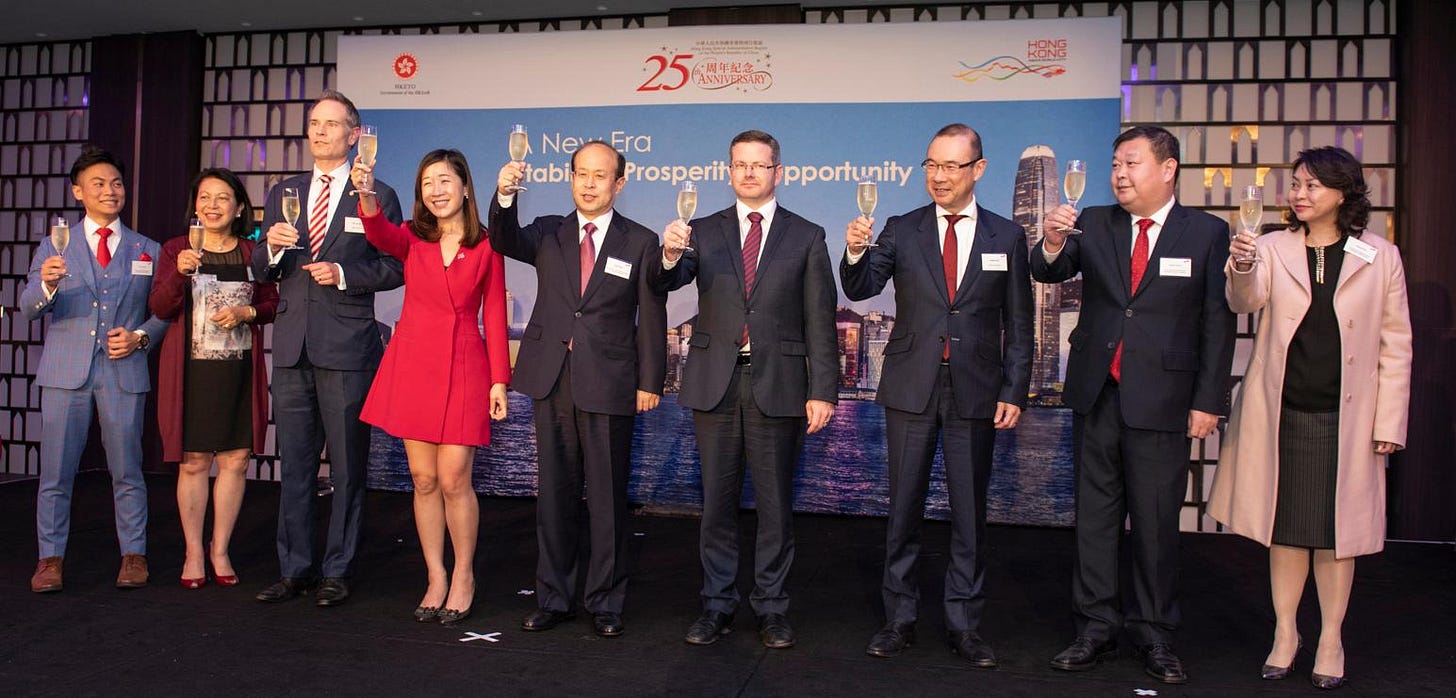Australia’s modified messaging, the limits of diplomacy, and federalising foreign policy
Fortnight of 4 to 17 July 2022
Australia’s modified messaging
Joint statement from prime ministers Jacinda Ardern and Scott Morrison on 31 May 2021:
“The Prime Ministers affirmed their strong support for open rules-based trade that is based on market principles. They expressed concern over harmful economic coercion and agreed to work with partners to tackle security and economic challenges.”
Joint statement from prime ministers Jacinda Ardern and Anthony Albanese on 8 July 2022:
“The Prime Ministers … agreed to continue to work together in the World Trade Organization, APEC and other key international organisations in support of open, rules-based trade.”
Quick take:
This is one of the clearest pieces of evidence yet that the new government is taking a softer diplomatic line on China. As I suggested last fortnight, a range of ministerial interviews seem to indicate that the Albanese government has opted to tone down the rhetoric around China’s trade restrictions. Rather than continuing its predecessor’s habit of regularly criticising China’s “economic coercion,” the new government has opted to highlight concerns about “sanctions” instead. With this latest joint statement providing a direct point of comparison between language from the previous and current governments, there’s now a much stronger case for concluding that a shift is taking place.
It’s certainly possible that Wellington welcomed the change in language and may have even pushed to not refer to economic coercion specifically. But given that it is Canberra that has conspicuously reduced its use of the term economic coercion since May this year, it seems plausible to conclude that the change was driven by the Australian government. Largely dropping references to China’s economic coercion now appears to be one of the most obvious examples of the Albanese government’s follow through on its commitment to use more cautious language on China. Minister for Defence Richard Marles summarised the government’s new approach on 8 July as a renewed emphasis on “the power of diplomacy and a change of tone”.
To be sure, Minister Wong did make two references to “coercive trade and economic measures” during a press conference with her Singaporean counterpart on 6 July. (And Minister for Defence Marles mentioned “coercive statecraft” and “coercion” in general in a speech and media release during his visit to Washington.) But despite being a regular feature of the previous government’s criticisms of China’s trade restrictions against Australian exporters, use of the specific term economic coercion by Australian ministers is now seemingly limited to relatively rare press conference remarks. In most instances, the Prime Minister and his ministers have preferred to use the less rhetorically charged term “sanctions” to refer to China’s trade restrictions (e.g., here, here, and here).
How much is the linguistic shift from economic coercion to sanctions likely to appeal to Beijing? The use of less rhetorically charged language will probably reduce the Chinese government’s frustration given Beijing’s clear displeasure with the label economic coercion. As Ministry of Foreign Affairs Spokesperson Zhao Lijian stressed on 8 July: “measures Chinese authorities have taken on imported foreign goods … are definitely not ‘coercive’ trade practices as described by the Australian side.” Despite this, it’s unlikely that Beijing will be entirely happy with criticisms of its sanctions. For one thing, the way in which China now describes the trade restrictions means that the Chinese government is likely to rebuff the accusation that it is imposing sanctions against Australia. In a way deeply at odds with the Albanese government’s description of China’s sanctions, Beijing now says that the trade measures are “completely reasonable, legitimate and lawful.”
On top of this disagreement over the legitimacy of China’s trade restrictions against Australia, Beijing is also likely to chafe at the sanctions label given the Chinese government’s generally negative view of these tools—at least when used by others (e.g., here and here). Despite China itself being a regular user of sanctions (e.g., here and here), President Xi Jinping argued last month: “It has been proved time and again that sanctions are a boomerang and a double-edged sword. To politicise the global economy … will only end up hurting one’s own interests as well as those of others, and inflict suffering on everyone.” So, even if the term sanctions might have less negative connotations than economic coercion, it seems likely that Beijing still won’t appreciate being accused of imposing sanctions on Australia.
None of this to say that Canberra should stop criticising Beijing for its use of sanctions/economic coercion. Given the international principles and Australian export interests at stake, calling out these measures is simply consistent with the prosecution of Australia’s interests. As Prime Minister Anthony Albanese put it on 13 July: “Australia will continue to assert our national interests, which are that these sanctions should be removed.” But it is to say that the diplomatic upside of criticising sanctions rather than economic coercion may be limited given the Chinese government’s regularly expressed views on the illegitimacy of sanctions (at least when imposed by others).

Diplomacy’s (limited?) dividends
Minister for Defence Marles speaking to Nine’s Sarah Abo on 8 July:
“[W]e will continue to advocate very strongly for Australia’s national interest. And there’s no backward steps in relation to any of that. But we are going to go about our business in the world in a way which is professional, which is sober, and which understands the power of diplomacy. And that’s what this meeting [between Australian and Chinese foreign ministers] is about today. And what you won’t see from this government is the kind of chest-beating that we saw from the former Coalition government, which actually did nothing to advance our national interest at all. Now, diplomacy we think, is important and we’ll see how far it takes us.”
Quick take:
Beijing should now be in no doubt: Despite softer diplomacy under the Albanese government, the substance of Australia’s China policies remains just as strong as it was during Scott Morrison’s tenure. Minister for Foreign Affairs Penny Wong was similarly unequivocal on 8 July when she met China’s Minister of Foreign Affairs Wang Yi: “Australia’s Government has changed but our national interests and our policy settings have not.” This followed a similar statement to the media earlier that same day: “We’re clear. We won’t be making any concessions when it comes to Australia’s national interests.” (Although the Minister for Trade and Tourism Don Farrell raised the prospect with The Guardian of nutting “out a compromise situation,” this comment was made specifically in the context of specific World Trade Organization disputes about barley and wine tariffs and duties rather than the broader bilateral relationship.) The general points about not compromising on the national interest were also reiterated by the Prime Minister on 9 and 13 July.
In response to Canberra’s firm statements of policy continuity, Beijing repeatedly called (e.g., here, here, here, here, and here) for the Australian side to “take concrete actions” to improve the Australia-China relationship. Minister Wong has freely said that stabilising the relationship “would require both parties to make a step.” But it’s unclear whether this “step” qualifies as the kind of “concrete action” that China seeks. Such an equation seems especially unlikely if the Australian step Minister Wong is referring to is limited to the adoption of softer rhetoric on China. On top of the possible gap between Australia’s “step” and China’s “concrete actions,” it appears that China and Australia have different end points in mind in any case. Per some of Minister Wong’s recent comments, Canberra seems to be aiming at the relatively modest goal of “stabilising the relationship.” By contrast, Chinese government representatives have called for “concrete actions” as a means of achieving a “reset” in bilateral ties. Seemingly, China has a much more ambitious agenda for improving relations, which presumably would require Canberra to make much more significant changes—hence the repeated calls for “concrete action” and reminders that “[t]here is no ‘auto-pilot’ mode in improving China-Australia relations.” So, in addition to differences between Canberra’s and Beijing’s views of precisely what changes relationship repair requires, they also seem to have in mind substantively different end points (i.e., Canberra’s stabilisation Vs. Beijing’s reset).
For these and other reasons I’ve written about previously, there’s a strong case for remaining circumspect about the long-term future of Australia-China relations. As the Minister for Defence observed on 8 July: “I can’t promise that the power of diplomacy will deliver anything specific in terms of trade or any … other outcomes.” This doesn’t mean that Canberra doesn’t have other options beyond diplomacy to achieve its desired stabilisation of bilateral relations. As I argued last week in The Sydney Morning Herald, proposing a rehabilitated ministerial dialogue on climate change might appeal to China without compromising on Australia’s security and economic interests or its commitments to human rights, the rule of law, and liberal democracy. But with Canberra rightly judging that improving bilateral ties shouldn’t come at the expense of Australia’s interests and values, Canberra doesn’t have that many options to shift the relationship dynamic. So, Canberra’s ongoing effort to eschew rhetorically charged language while pursuing substantive policies that still deeply frustrate Beijing looks set to provide a consequential case study in whether finessing diplomatic messaging is powerful enough to alter the trajectory of a bilateral relationship.
Federalising foreign policy
China’s Ambassador Xiao Qian speaking at the celebration of the 25th anniversary of the establishment of the Hong Kong Special Administrative Region on 5 July in Sydney:
“Over the past two years and more, the Hong Kong national security law has been formulated and enforced, and the electoral system has been amended and improved, ensuring the implementation of the principle of patriots administering Hong Kong. It has served to fully ensure the democratic rights and freedoms enjoyed by Hong Kong residents.”
Quick take:
These remarks from the Ambassador are starkly at odds with the severe erosion of political rights and freedoms with which Beijing has hobbled Hong Kong in recent years. As Foreign Minister Wong observed on 30 June: “The National Security Law has been applied broadly to arrest or pressure pro-democracy figures, opposition groups, the media, trade unions and civil society. The electoral reforms imposed by Beijing in 2021 have further eroded Hong Kong’s democratic governance.” There’s no evidence (that I can see) that representatives from the Australian federal parliament attended the celebration at which the Chinese Ambassador spoke. Nevertheless, a New South Wales government Minister and Member of the Legislative Assembly were present.
My thought bubble: This once again reinforces the rationale for an integrated and federalised approach to Australia’s external policy. Canberra is ultimately responsible for the key pillars of Australia’s external policy. But the reality of contemporary international relations involves extensive paradiplomacy, including subnational government-to-government engagements between, for example, New South Wales and Hong Kong. This creates a compelling case for state and territory government ministers, parliamentarians, and bureaucracies to be receiving regular briefings and advice from the relevant federal government departments and agencies on a range of foreign and security policy issues.
The above is not to suggest that the federal government isn’t already regularly communicating with the states and territories on a range of these external policy considerations. From what I’ve heard anecdotally (and I freely admit it’s just anecdotal!), they are, albeit not broadly and deeply enough to meet state and territory demand. There’s equally no reason to think that Minister for Multiculturalism and Minister for Seniors Mark Coure and Member of the Legislative Assembly Tim James weren’t armed with the relevant details about the dire political situation in Hong Kong prior to attending the celebration. Still, given the significant exposure of state and territory governments to extremely thorny foreign and security policy issues, it’s worthwhile regularly revisiting the kinds of structures and processes that might further strengthen Australia’s whole-of-nation external policy.

As always, thank you for reading and please excuse any errors (typographical or otherwise). Any and all objections, criticisms, and corrections very much appreciated.



